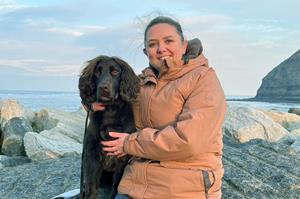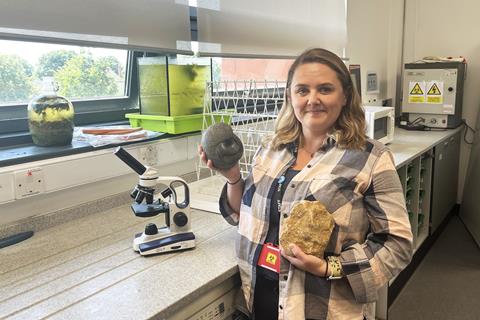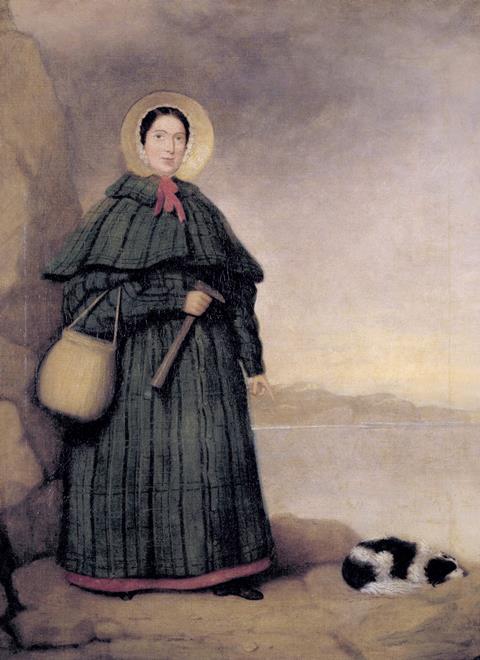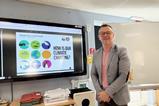Geoenvironmental engineer turned science technician Lisa shares the ability she thinks all technicians should have in their toolkit
-

Lisa Craig studied applied geology and worked as a geoenvironmental engineer before having her son. After spending seven years as a stay-at-home mum, volunteering at her son’s primary school and Beaver Scout group, she saw a job advert for a part-time science technician at the local secondary school. Science and working with kids is the perfect combination for her. She’s now lead science technician at Chipping Norton School in Oxford and was recently awarded RSciTech status.
Image source: © James Craig
Lisa Craig studied applied geology and worked as a geoenvironmental engineer before having her son. After spending seven years as a stay-at-home mum, volunteering at her son’s primary school and Beaver Scout group, she saw a job advert for a part-time science technician at the local secondary school. Science and working with kids is the perfect combination for her. She’s now lead science technician at Chipping Norton School in Oxford and was recently awarded RSciTech status.
What’s one piece of kit in your lab that you couldn’t live without?
The speakers on my PC, I often listen to music as I am prepping.
If budget was no object, what’s one piece of kit you would love to have in your lab/prep room?
I would quite like a diamond knife: a teacher recently showed me a video of someone using a lab-grown diamond knife to cut effortlessly through a block of ice.
Tell us your most memorable moments as a school science technician
The strangest thing I’ve had to do is write a risk assessment for our school’s human brain specimen. I had to envision what could go wrong and dropping the large jar containing the brain was top of the list. It’s not something I ever expected to write about. My computer also kept autocorrecting brain to Brian which made it even funnier: ‘In the event Brian is dropped’.

How do you relax?
I love watching movies and TV dramas (I recently watched and loved Yellowstone and its prequels). I also hand sew patchwork quilts. It’s something you can do while half watching the TV and its repetitive nature is quite meditative.
We have a campervan and go on lots of trips in the UK and mainland Europe. My favourite place that we’ve travelled to so far has been Slovenia. I also have a spaniel called Jango (named after the Star Wars character) who takes up a lot of my time.
What is your favourite experiment to set up?
I am a big fan of the cannon fire demonstration. It’s rarely done, but the sounds echoing around the lab are amazing: it really does sound like distant cannon fire.
What is your favourite experiment to set up?
I am a big fan of the cannon fire demonstration (rsc.li/4eA160w). It’s rarely done, but the sounds echoing around the lab are amazing: it really does sound like distant cannon fire.
What do you wear to school? Do you have a favourite outfit for work?
I usually wear black jeans with a shirt or jumper depending on the weather, the school takes a while to warm up after the holidays. I also like my hot water bottle and fingerless gloves in the colder months.
Get involved
Want to suggest a question? Want to be the next teacher, technician or trainer in this series? Email education@rsc.org today.
What’s on your bookshelf?
I have a stack of non-fiction books to get through, including Entangled Life by Merlin Sheldrake (about fungi) and All That Remains: A Life in Death by Professor Sue Black (what can be learned about a person’s life by studying remains). I am currently reading Northerners: A History, from the Ice Age to the Present Day by Brian Groom – I’m originally from West Yorkshire but now live in Oxfordshire. My favourite book of all time is Jane Eyre by Charlotte Brontë.

Imagine you can only share one piece of advice with your fellow technicians, what would you say?
Cultivate the ability to say no. If you think something is unsafe, isn’t recommended by CLEAPSS, or just isn’t possible, you can say no.
… And imagine you can only share one tip with teachers about making a technician’s life easier, what would you say?
Try to get the trolley back to the technician in the same state it came out. It’s so irritating when everything is shoved back on the trolley willy-nilly, and all the components are mixed up or left turned on, wasting batteries.
Who’s your hero?
I’m a massive fan of Mary Anning, not just for her scientific ability after being self-taught, but for her ability to keep going even when male scientists at the time misattributed her accomplishments. Thankfully her genius has been posthumously recognised and I have visited her grave and statue in Lyme Regis.
Are you involved in any extracurricular activities?
Since volunteering with my son’s Beavers pack, I have become a fully fledged Cub Scout leader for kids aged 8–10. I love organising sessions and my school kindly lets me borrow small pieces of kit to help the Cubs with their badges. I am also a STEM ambassador, and I am planning on going to other local Cub Scout packs to help the kids with their science badges.
Teachers ask technicians
In the last Meet the … article, we asked Sharon Smith to suggest a question for the next interviewee. She asked:
In the last Meet the … article, we asked Sharon Smith to suggest a question for the next interviewee: She asked:
With advancements in AI, what do you predict science teaching and hands-on practical work will look like in 20 years’ time?
I think that live demos will still be hugely important. Watching videos may teach you something, but I find that learning by doing is best. Practical skills stay with learners the rest of their lives and offer immensely transferable skills for all aspects of the world outside the lab.
We asked Lisa for a question for the next interviewee, and she suggested:
How do you like your tea?
Emily Kelly











No comments yet